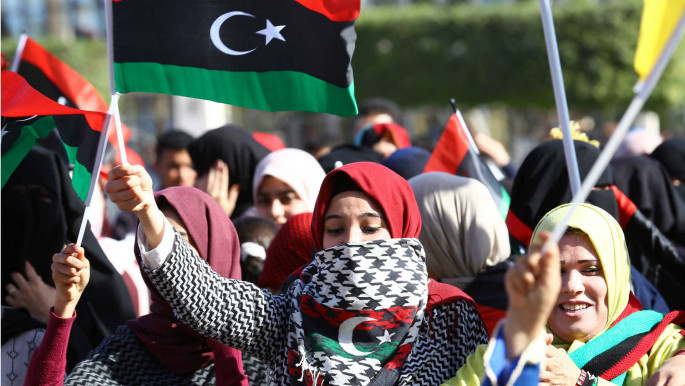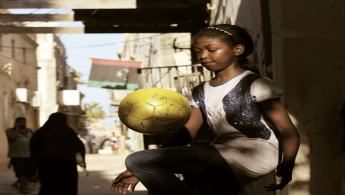Freedom Fields: Tracing the Libyan women's football journey of recognition over the hurdles of unrest
Freedom Fields, directed and produced by Naziha Arebi, a British Libyan Director, follows the Libyan Women's Football team in their journey across five years after the Libyan revolution, to gain recognition and freedom to play.
The topic may be about football on the surface but it's much more rooted in sisterhood, solidarity and absolute determination to change a stagnant country.
As I sat down in our living room with my parents in the background, unaware of the deep discussions coming their way, I was immediately pulled in by the charisma of the women on my screen.
Hearing my mother tongue in a dialect I missed so much meant that I was in tears almost immediately, in anticipation of the second hand pain I knew was coming.
There is something to be said about watching a film based in your home country while living in the diaspora. And experiencing not only my impressions of the film but also generational impressions through discussions with my family, really opened my eyes to how topics like female empowerment and autonomy are perceived through intersecting identities.
I watched Freedom Fields through the lens of a young Libyan woman that has lived in London for two decades and longed for an inclusive society back home.
While my parents perceived the scenes of the documentary through a stringent need to be proud Libyan immigrants with an equally romanticised view of our country as myself, but a deeper entitlement and demand for the romanticised image to stay intact.
To some extent football has been a recurring narrative for my family, and my parents' investment in this story felt quite personal.
Faisal Halab, a Libyan footballer circa 80s is my granduncle on my mother’s side and I grew up hearing of my father’s love for football and the times he played for Al-Dahra for a good chunk of his younger years in Libya.
Neither parent had grown up seeing a need for a female football team, or perceived it as a problem that we had never allowed women to play internationally.
Yet after the initial siding with the Libyan Football Federation and the decisions they made, I saw my parents' views change in real time as the film progressed.
 |
In showing scenes of unparalleled resilience paired with euphoric existence you are pulled into a world of authenticity, to a demographic not given the privilege to be seen as whole |  |
Through personable and candidly intimate shots, Naziha builds the vulnerability and passion of the footballers to a heart wrenching level.
When Asia stands up in front of the Federation in contempt of the decision to ban the team to travel to Germany for games they have been training for, exclusively due to hate mail received by a fraction of a society that has a history of fear of change, as the audience, you are there with her in her anger.
When the needs and dreams of these women are disregarded and belittled over and over again, you see in them every time women all over the world are belittled and disregarded due to their gender.
When the entire team responds to the name "Fadwa", the team’s captain who refused to be gaslit into believing that the federation had their best interest at heart while simultaneously separating them and exploiting them for funds, in an attempt to protect her, you feel their solidarity to your core.
 |
They saw my sister and I in every woman in Freedom Fields fighting for the utmost minimum from the country they wished would feel as proud of them as they did of it |  |
Moments of upset and tension are inevitable in a documentary seeking to tell a female perspective in a country that does not have unbound equality of the sexes.
However, the film is not only strung together with trauma, but holds itself in the moments of female prosperity. The moments of day to day happiness of enjoying ice cream and singing along to pop hits in car rides, shows a side to the featured footballers that is overlooked not only by the Libyan Football Federation, but more importantly, by the society they are existing in.
 |
| Read also: Libyan woman fighting the gender gap and violence |
In showing scenes of unparalleled resilience paired with euphoric existence you are pulled into a world of authenticity, to a demographic not given the privilege to be seen as whole.
This topped with showing the vocal support some footballers had from their families. As well as, some female internalised misogyny in contrast with the men who did not subscribe to the patriarchal system and refuse to contribute to it.
All that breaks the narrative that the problem is binary. But instead, discusses the topic through a subtle acknowledgement that the problem is systematic, not gendered.
My parent's initial denial of the way the female footballers were treated, turned into embarrassment and anger at the country they hoped would have improved post revolution.
They saw my sister and I in every woman in Freedom Fields fighting for the utmost minimum from the country they wished would feel as proud of them as they did of it.
Follow her on Twitter: @fkried



